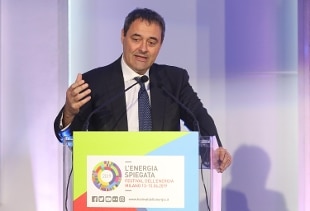Stefano Besseghini, pres.
Arera (Ansa)
Expensive bills: why will prices rise?
Three billion to counter the expensive bills.
And the quarantine allowance returns
Share
28 September 2021 In the fourth quarter (October-December) the electricity bill will increase by 29.8% for the typical household in protection and the gas bill by 14.4%.
This was announced by the Regulatory Authority for Energy, Networks and the Environment, communicating the increases that have started on Friday. "The extraordinary dynamics of the prices of raw materials towards historical highs and the high prices of CO2 emission permits, would have led to an increase of more than 45% of the electricity bill and of more than 30% of that of gas", explains Arera, who intervened thanks to the Government's emergency decree which allocated the necessary resources.
The over 3 billion euros allocated by the Government with the Decree-Law of 27 September 2021, n.130 ("Urgent measures to contain the effects of price increases in the electricity and natural gas sector"), were allocated to contain the household and micro-enterprise bills, allocating € 2.5 billion to the elimination of general system charges for the next quarter and approximately € 500 million to the enhancement of bonuses. Added to this was a 5% reduction in VAT for gas bills, explains Arera, who was thus able to confirm the reduction in general system charges for the October-December quarter envisaged for most electricity customers, eliminating them also for domestic customers and small low voltage businesses. Even the gas bill, for this quarter,it will be less heavy for the part relating to system charges, which are also greatly reduced to the generality of users, thanks to the extraordinary resources allocated.
In particular, in the detail of the individual components in the bill, for electricity the increase is mainly linked to the rise in the raw material component, with an impact of + 41.5% on the price of the typical household (broken down into: +41, 1% due to the energy item PE, + 0.4% linked to the dispatching item PD), offset by the strong reduction / elimination of general system costs, -11.7% between Asos and Arim, thus reaching +29, 8% final for the typical family who does not receive the discount bonuses. Overall regulated network tariffs (transmission, distribution and metering) remained unchanged.
For natural gas - explains Arera -, the trend is determined by an increase in the raw material component, based on forward prices for the next quarter, with an impact of + 30.3% on the final price of the typical family. Added to this is a slight increase in network tariffs (transmission, distribution and metering) + 1.8%. Increases partially offset by the reduction / zeroing of general system charges, -3.7%, and by the decrease in VAT, which weighs in at -14%. This leads to + 14.4% for the typical protected user who does not receive the discount bonuses.
Unc: 355 euro sting, it is a historical record
According to a study by the National Consumers Union, for a typical family this means spending on an annual basis (not, therefore, according to the rolling year, but from 1 October 2021 to 30 September 2022, assuming constant prices), 184 euros plus for electricity and 171 euros for gas. A higher overall cost, therefore, of 355 euros. "Unfortunately, as we had announced, the billions allocated by the Government were completely insufficient and were not enough to prevent a record sting that will send household budgets into a tailspin, except for those in economic distress" says Marco Vignola, head of the energy sector of the 'National Consumers Union. "A record increase. For light, never since there are quarterly tariff updates established by the Authority, ie from January 2003,there were such high rises, while for gas this is the second largest increase ever, after that of the previous quarter. Now we ask the Government that the elimination of the costs of the electricity and gas system and the reduction of VAT for gas become definitive and that action also be taken on gas excise duties. The incentives must be financed with general taxation, always, without ifs and buts! "Concludes Vignola."concludes Vignola."concludes Vignola.

